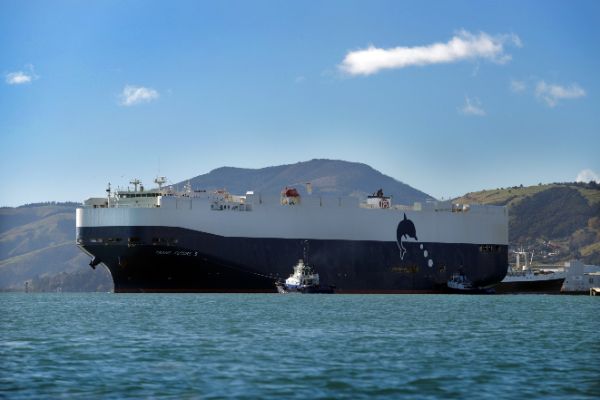The Evolving Definition Of Essential Work At The Port
The rapidly evolving situation of COVID-19 has seen the constantly evolving definition of ‘essential business’. Under initial advice forestry exports from the port had been halted, while the movement of forestry cargo to release vital space for essential cargo is allowed. However, forestry is not limited to our region, and while other ports across New Zealand load log vessels to clear on port space it is necessary for Port Nelson to also fill the shared capacity on these vessels to continue the momentum of the supply chain, ensuring a full load and feasibility of the voyage. Consequently, log vessel arrivals will be approved on a case by case basis.
The arrival of the Trans-Future car carriers (RoRo vessels) are a familiar sight in Nelson, these had also been brought into question with vehicle imports being classified as non-essential by the Ministry of Transport. During the week, discussions between the shipping lines, New Zealand ports and importers has resulted in further clarity around the cargo on RoRo vessels, some of which are already in New Zealand and others that are en-route. These carriers hold a combination of non-essential and essential cargo including emergency service vehicles, supermarket delivery vehicles, heavy machinery, public and logistics transport vehicles that are deemed essential during level 4. Additionally, these carriers are also required for the export and import of cargo at other international ports, meaning halting or clogging these vessels would further impact global supply chains and leave unclaimed New Zealand cargo elsewhere.
On further advice and ensuring that this cargo can be unloaded from carriers and moved off port within government guidance and social distancing practices, the Ministry of Transport have now deemed RoRo vessels as an essential service.

Capacity wise Port Nelson is lucky to receive minimal non-essential imports which allows more room for essential containers, with space not being congested by non-essential containers unable to be cleared or collected. Essential imports of fuel and fertiliser continue to be received and moved out to the region.
Mid-week the Port also received notice of a change in decision on the continued construction of Main Wharf North under alert level 4. This construction project had initially been deemed as critical infrastructure. The construction work has now ceased until further instruction from the Ministry of Business Innovation & Employment.


 PSA: PPPs Pose Risks To New Zealand Workers
PSA: PPPs Pose Risks To New Zealand Workers Office of the Privacy Commissioner: New Research Shows Business Leaders Fear Being On The Hook For Others’ Privacy Breaches
Office of the Privacy Commissioner: New Research Shows Business Leaders Fear Being On The Hook For Others’ Privacy Breaches E Tū: E Tū Members Send Open Letter To James Grenon And NZME Board
E Tū: E Tū Members Send Open Letter To James Grenon And NZME Board Commerce Commission: Commission Calls For Comments On Copper Access Deregulation
Commerce Commission: Commission Calls For Comments On Copper Access Deregulation New Zealand Association of Scientists: NZAS Supports Saving Biotechnology Capacity In Callaghan; Asks What Now For Applied Technology Group
New Zealand Association of Scientists: NZAS Supports Saving Biotechnology Capacity In Callaghan; Asks What Now For Applied Technology Group Stats NZ: Business Employment Data - December 2024 Quarter
Stats NZ: Business Employment Data - December 2024 Quarter



